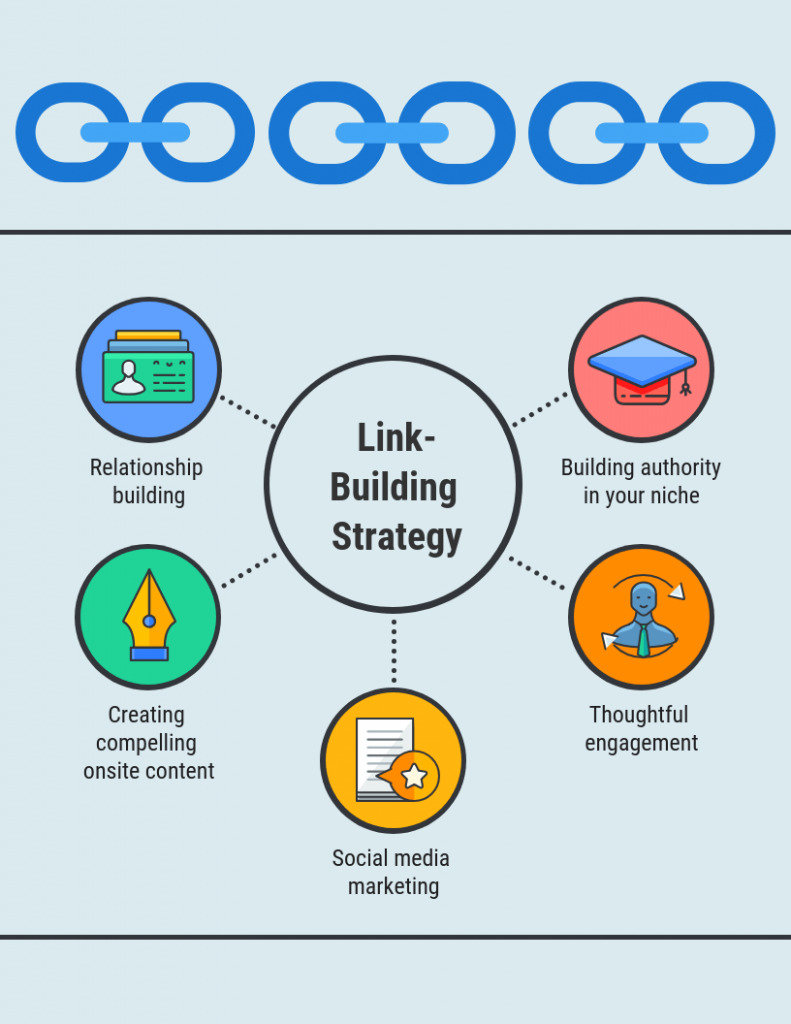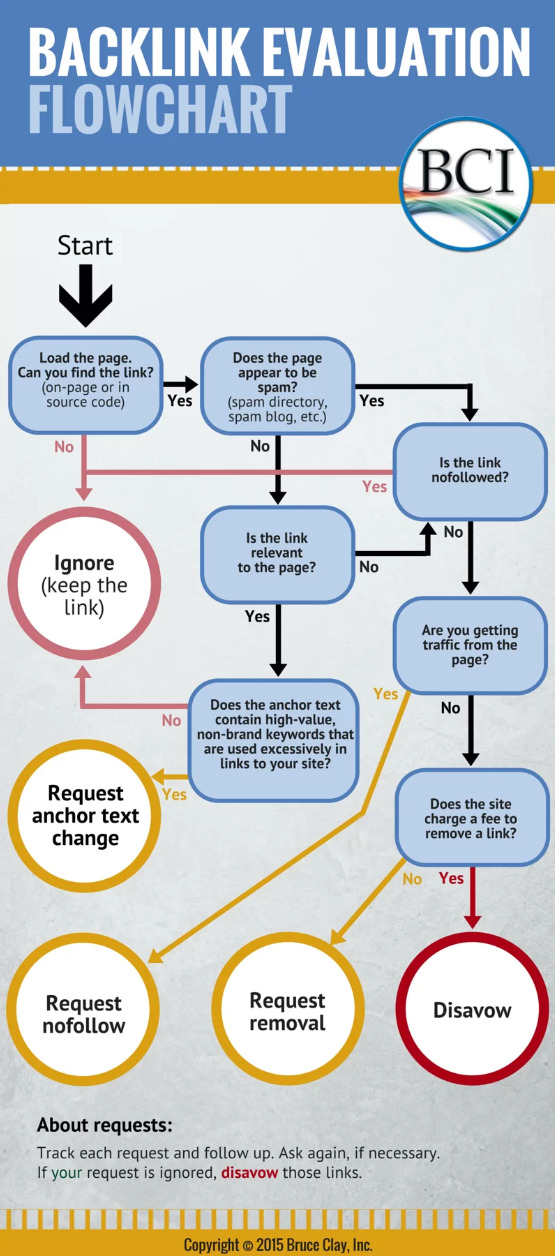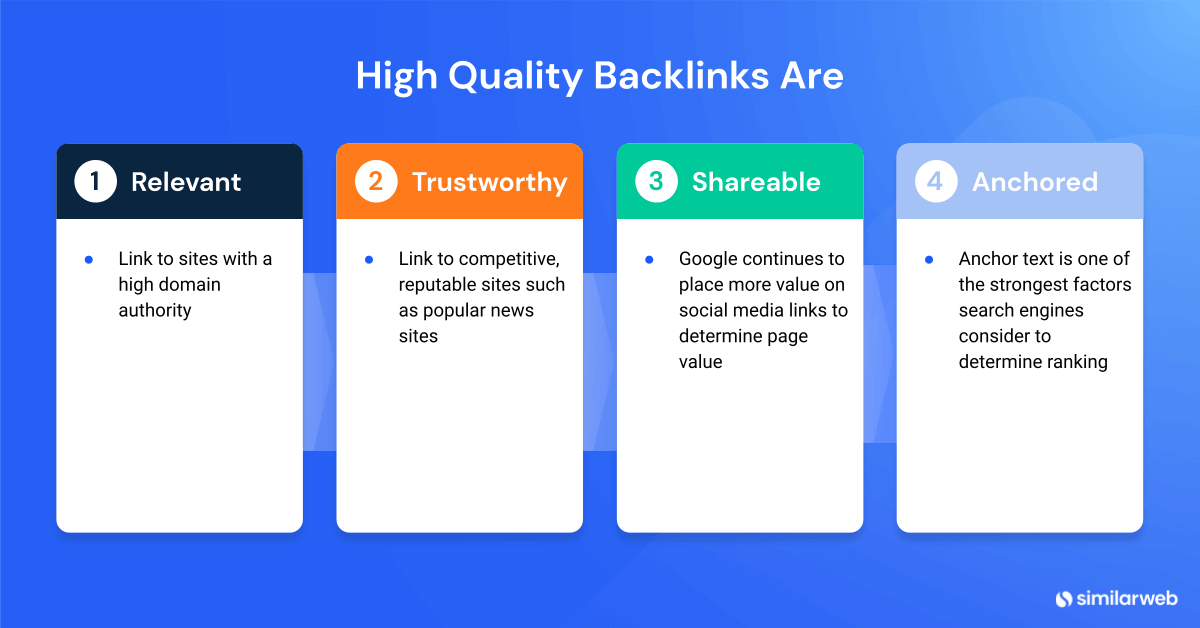| Summary |
| Backlinking strategies are built to increase search engine rankings, thus increasing website traffic. Building backlinks also makes your brand a thought leader and brand awareness to users. In short, backlinking effectively promotes your website through other websites’ blogs. Google’s search engine has top-ranked results with more backlinks than the results after that. Thus, you can use strategies like emailing site owners to request backlinks, creating blogs, and rounding up relevant statistical data from third-party sources. |

Backlink building is done to establish expertise in your niche and helps increase search engine rankings. The Google search results page has its top result sites with 3.8 times more backlinks than those below or after.
I’ll share with you some of the great strategies that aren’t costly yet effective for website backlinking and thus increasing your search engine rankings and website traffic.
Backlinking: An SEO Strategy
Backlinking technically refers to the external links on a website being redirected to another website once you click that link. Backlink building is used as an SEO strategy for improving search engine rankings and website traffic.
Now, let’s head on to the strategies for backlinking.
1. Reach Out To Your Targets
Reaching out to your targets doesn’t mean you’re being pushy or imposing your work on other websites. Also, there’s no harm in offering helpful articles, blogs, statistical research, or guides, which might help them with their blogs by getting valuable and credible sources.
You can try reaching out to the site owner through email. Furthermore, you can bring up the blog or article on their website that you’ve found interesting and suggest your content relevant to their content, which they can include on their blog.
2. Brian Dean’s Skyscraper Technique
Brian coined the term “skyscraper technique,” a strategy that improves popular content by creating the same content and linking it to the site it was backlinked to rather than the original one.
On the other hand, you can also use the reverse skyscraper technique for those below-performing contents. You can revise such content and request the site it was backlinked to use the new link instead.
Book to Read: Ultimate Guide to Link Building
3. Tangential Content
Tangential content is not directly related to the brand campaigns or the site’s industry.
Yet they get 30% more links. Tangential content gets 77% of social media shares compared to those on-brand campaigns.
The strategy is to be creative, engaging, and relatable in making these tangential contents to get backlinks even from sites that aren’t related to your niche.
4. Link Roundups
Sharing your expertise lets you establish your brand as a thought leader. It will help you get the consumers’ trust, which will also help your brand awareness.
You don’t just establish authority to consumers, but other brands or websites since your content can be valuable enough for them to link it to their page. These webpages or brands that need statistical data, a study, or other forms of expertise can be taken from your content and linked to their blogs or articles.
5. Ask For A Backlink For Unlinked Mentions
Use Google Alerts to notify you whenever someone mentions your brand on search engines, so you can see if it’s linked to your website.
But if you want to run across websites to see if they mention your brand or websites, you can use tools like Ahrefs Content Explorer. However, this is a paid tool.
Use Rank Tank with its Unlinked Brand Mentions Finder for a free tool.

6. Backlinking On Email Signatures
Email signatures let you plug in your website or ad campaign page. It’s free and sendable to thousands of contracts.
7. Fixing Broken Backlinks
Let users who’d want to access your website have a smooth experience by fixing the broken links or the 404 pages. Thus, less website traffic, but you can treat this underlying symptom using backlink tools that can detect broken links.
Create a list of these broken links and replace them with URLs that will redirect to a working webpage. If the broken links are on a different site, you can request to replace them with new links.
Book to Read: Backlink Explosion
8. Look For Your Competitors’ Backlinks
You can look through your competitors’ backlink performance using backlink checkers. In sum, it will provide you with analysis and the progress of their backlinks to copy their strategies or see where you can improve them.
Backlink Checker
Backlink checker tools monitor your backlink’s profile progress and your competitors. Whether free or paid, you can check out these tools with their following features.
Ahrefs
Ahrefs lets you have either a free or paid account to get an analysis of your backlinks, such as where they came from and the anchor text used from those backlinks.
Google Search Console
Google’s very own Search Console lets you have analysis from the links to your site. You’ll be able to get the following:
- Most backlinked contents
- Sites linked to your content the most
- Anchor texts used from those backlinks
Rank Signals
Rank Signals is free and lets you know the number of external links to your webpage, the number of social media followers of the particular website, and page rankings.
Open Site Explorer
Moz’s Open Site Explorer is a backlink analysis tool that lets you have the number of links on the site, spam score, and page authority.
SEMrush
Even with a premium SEMrush account, you can monitor several competitor sites’ backlinks data, particularly any URL that can be tracked.
Buzz Sumo
Buzz Sumo is a paid tool, but its feature can provide information regarding what type of content makes the links more engaging and drive more traffic. It also provides the following:
- Performance of the backlinked contents
- Webpages that are most and frequently shared
- Comprehensive information from your competitor backlinks
Open Link Profiler
This Open Link Profiler provides information on the demographics of the backlinks, even though it’s free. It may also show which backlinks to eliminate to boost page rank.
Book to Read: Master BUILDING BACKLINKS like Pro
9. Content Curation
Content curation lets you create backlinks from different sites tailored to their content’s relevance to your blog content’s topic. In addition, you’ll be able to provide valuable sources to the readers, and other websites can find your content well enough to get a backlink.
10. Conversational Content
You may start with conversational content on blogs like reviews, reactions, or your take on a particular issue or matter. Other bloggers or writers can refer to your content or take on the matter and link back to it.
11. Giveaways
To boost your brand awareness, you can reach out to bloggers and offer your product or services as a giveaway to the contest they’ll be holding for their followers.

Why Are Backlinks Important?
You should know how backlinks work, especially with Google’s search engine page and algorithm. Backlinks are a trust indication for Google, meaning the linked page contains valuable information.
Conclusion
You can try many workarounds to improve your site’s traffic, including backlink building. It doesn’t need to be costly, like getting a paid backlink checker.
Your efforts to reach out to the site owner, fix broken links, or put backlinks on email signatures can go a long way. Thus, helping you in brand awareness and establishing thought leadership.
Did you find this article helpful? You can check out these blogs for other ways to boost your SEO rankings.



